
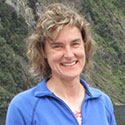
Zoologist
NOAA/NMFS National Systematics Laboratory, National Museum of Natural History, Washington, D.C.
Dr. Nizinski earned a B.S. in biology at West Virginia Wesleyan College, a MS in zoology at the University of Maryland, and her Ph.D. in marine science at the Virginia Institute of Marine Science, School of Marine Science, College of William and Mary. She has been employed by the Systematics Laboratory since 1987, first as a technician, then as a zoologist. After completion of her doctoral degree in 1998, Dr. Nizinski began her research program studying the biodiversity, biogeography, taxonomy, and systematics of marine invertebrates, particularly decapod crustaceans. She has participated in 30 offshore cruises, eight as Chief Scientist. Her current research interests include biodiversity, biogeography, and community structure of decapod crustaceans and biodiversity and community structure of invertebrate fauna associated with deepwater coral reefs. Dr. Nizinski is the Chief Scientist for the Northeast Regional Deep-Sea Coral and Sponge Initiative, investigating deep-sea coral habitats, particularly those is submarine canyons, throughout the region. She is currently a member of the Southeast Regional Deep-Sea Coral and Sponge Initiative science team. Dr. Nizinski and Dr. Metaxas will share chief scientist duties on this cruise.
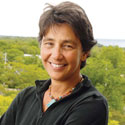
Professor in Oceanography
Dalhousie University
Dr. Metaxas received a B.S. in Biology from McGill University in 1986, a Master of Science in Oceanography from the University of British Columbia in 1989, and a Ph.D. from Dalhousie University in 1994. She spent two years at Harbor Branch Oceanographic Institute followed by 1.5 years at Woods Hole Oceanographic Institution as a postdoctoral scholar. Her research focuses on the factors that regulate populations of benthic marine invertebrates, particularly early in their life history. She uses a combination of approaches, such as field sampling, laboratory experiments, and mathematical modelling, to study organisms of ecological and economic importance, including invasive species, habitat engineers, and coral reefs. She has worked in different habitats from shallow rocky subtidal regions to the deep sea, including hydrothermal vents and deepwater corals, in temperate and tropical regions of the world. Her research has implications for marine conservation, such as the establishment and success of conservation areas for benthic populations. She is currently involved in a number of national and international initiatives that have as an ultimate goal the translation of scientific outcomes into information relevant to policy.
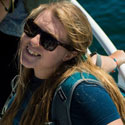
Biological Oceanography Graduate Student
Dalhousie University
Arieanna graduated from the University of Guelph with a Bachelor of Science in Marine and Freshwater Biology and a minor in Mathematical Science in June 2016. Her previous experience includes work in an aquatic ecology lab studying endangered freshwater unionid mussels. She is now pursuing a Master’s degree in Halifax at Dalhousie University under the supervision of Anna Metaxas in Biological Oceanography. Her current research is investigating the incorporation of ecological criteria into marine protected area (MPA) design, namely population connectivity. This ecological criterion considers linkages of species at different life history stages (larvae, juveniles and adults) among spatially distributed habitats and is important for MPA network design and population resilience. This research is part of the Canadian Healthy Oceans Network (CHONe), which is a Canada-wide collaboration between universities and the Canadian federal government (Department of Fisheries and Oceans). The overarching goal of CHONe is to develop sustainable conservation and monitoring strategies and assess cumulative impacts on Canada’s changing oceans.
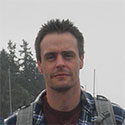
IT and Navigation Technician
Canadian Scientific Submersible Facility (CSSF)
Barry provides vehicle electronics, information technologies, and navigation support services for the ROPOS systems. He gained extensive experience with inertial navigation system while working at iXBlue for over eight years prior to joining the ROPOS team in 2012. Prior to his work with iXBlue, Barry spent eight years in the Canadian Navy as an electronics technician.
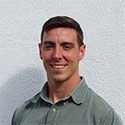
Mechanical Technician
Canadian Scientific Submersible Facility (CSSF)
Luke is responsible for providing design, integration, and support to various mechanical systems at CSSF. He joined the team in 2016 and holds a B.Eng in Mechanical Engineering from the University of Victoria. He has a keen interest in oceanography and subsea vehicles.
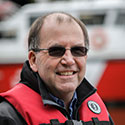
Research Scientist
Fisheries and Oceans Canada (DFO)
Based out of DFO's Biological Station, Saint Andrews, New Brunswick, Dr. Peter Lawton has conducted research and science advisory work on numerous fisheries-, aquaculture-, and marine conservation-related issues across the Bay of Fundy and northern Gulf of Maine. He graduated from the University of Bradford in England with a bachelor's degree in environmental sciences and then earned a Ph.D. in Marine Zoology from Bangor University, Wales. During the mid-1980s, he held post-docs with DFO and at the Marine Sciences Research Center, State University of New York, Stony Brook, before joining DFO in 1989. Since the late-1990s, his primary research interest has been the development of seabed habitat mapping approaches in support of ecosystem-based management, for which he makes extensive use of underwater optical imaging systems. He served two terms as Executive Director of the Canadian Centre for Marine Biodiversity and was the Canadian lead for the synthesis phase of the Gulf of Maine Area Program of the Census of Marine Life. He is currently one of DFO’s science leads within the Canadian Healthy Oceans Network. Peter has been a scientific diver for DFO since 1989 participating in numerous coastal expeditions, as well as six offshore cruises, including three ROPOS missions. On the Bigelow cruise, Peter will be helping to direct ROV dives, with a particular interest in looking at the association of fishes and crustaceans with biogenic habitat features, including corals and sponges. He will also be bringing along some of his digital still and digital video camera systems to help document the survey activities.
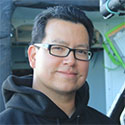
Electrical Engineer
Canadian Scientific Submersible Facility (CSSF)
Jonathan is an electrical engineer and provides electrical and electronic design and support for all of ROPOS' systems. Jonathan holds a B.Eng. in Electrical Engineering from the University of Victoria. When he joined CSSF, he had over seven years of experience in data communication, VoIP, and monitoring and diagnostic systems.

Mechanical Engineering Technologist
Canadian Scientific Submersible Facility (CSSF)
Peter provides support for the mechanical systems. Peter is a trained Mechanical Engineering Technologist and has been with CSSF since 2011. He has two years’ experience manufacturing and two years’ experience working with underwater logging machines.
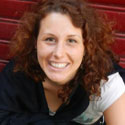
Ph.D. Student in Ocean Sciences
Memorial University of Newfoundland
Originally from Italy, where she received her M.S. in Marine Biology in 2015, Marta is now doing her Ph.D. in Ocean Sciences at Memorial University of Newfoundland, Canada. She is studying deep-sea benthic ecosystem functioning in different soft sediment habitats in the North Atlantic area. Her project, sponsored by CHONe (Canadian Healthy Ocean Network), aims to shed the light on different benthic processes, such as organic matter remineralization and carbon cycling, and on the role played by infaunal animals and environmental variables in influencing these key biogeochemical cycles. Marta will be collecting soft sediment cores using the ROPOS remotely operated vehicle during the expedition, and she is looking forward to being part of the team and to unlocking some of the secrets hidden in the mud.
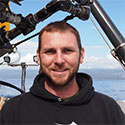
Computer Automated Systems Technician
Canadian Scientific Submersible Facility (CSSF)
Peter is a trained computer automated systems technician. He has worked with ROVs since 2003 and has worked specifically with underwater logging machines from 2008 to 2012. He joined the CSSF mechanical team in 2012 and provides help with anything mechanical.
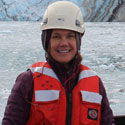
Research Geneticist
U.S. Geological Survey, Leetown Science Center
Cheryl Morrison is a Research Geneticist at the U.S. Geological Survey (USGS) Leetown Science Center in Kearneysville, West Virginia. She has always loved the ocean, from Maine tide pools to tropical coral reefs. She followed this passion through an undergraduate degree in Marine Biology from the University of North Carolina at Wilmington (1991), and a Ph.D. from Florida State University in Biological Sciences (1997). She has been studying cold water coral ecosystems for over a decade in the Gulf of Mexico and Atlantic and Pacific Oceans and has participated in 23 research cruises using submersibles and remotely operated vehicles to explore benthic habitats. Her current research involves the utilization of genetic and genomic techniques to aid in the study of biodiversity at deep reefs, including the identification of corals and associated organisms, and to estimate population connectivity that may occur through dispersal of juvenile coral larvae between geographically separated populations. During this mission, she will be collecting samples of red tree coral (Primnoa resedaeformis) and bubblegum coral (Paragorgia arborea) for on-going studies of connectivity among populations inhabiting western Atlantic canyons and the Gulf of Maine. She is very excited to witness the Gulf’s underwater habitats for the first time.
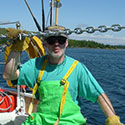
Marine Ecologist
NOAA/NMFS Northeast Fisheries Science Center's Habitat Ecology Branch
Dave Packer is a marine ecologist with NOAA/Naitonal Marine Fisheries Service (NMFS) Northeast Fisheries Science Center's Habitat Ecology Branch at the James J. Howard Marine Sciences Laboratory in Highlands, New Jersey. He received a BS in zoology and mediocrity at Ohio State University, and a MS in oceanography from the University of Maine. Prior to joining NOAA, he spent time working for several government agencies including the National Park Service, U.S. Forest Service, and Bureau of Land Management, and got his start in marine biology at the Smithsonian Institution's Marine Systems Laboratory and the Enivronmental Protection Agency's Chesapeake Bay Program. He has been involved in many diverse projects at NMFS, including research on living marine resource habitats/ecology, synthesizing science information for use in formulating policy and resource management issues and decisions, and developing NMFS national/regional policies and guidances. He has been particularly involved in the NMFS's Essential Fish Habitat initiative and the Northeast Regional Deep-Sea Coral and Sponge Initiative, specializing in research and surveys on Gulf of Maine deep-sea coral habitats. Also, it isn't easy being green.
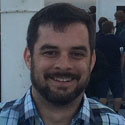
Spatial Ecologist
NOAA National Centers for Coastal Ocean Science
Matt Poti is a spatial ecologist with the NOAA National Centers for Coastal Ocean Science. He received a B.S. in Biology and B.A. in Chemistry from the University of Richmond and a Master of Environmental Management degree from Duke University. In his 7 years with NOAA, Matt has used spatial and statistical analyses and modeling of ecological data to inform a wide range of marine resource management and spatial planning priorities. Recently, he has been involved in the development of statistical models that identify areas likely to have suitable habitat for deep-sea corals in the U.S. Atlantic, Gulf of Mexico, and Main Hawaiian Islands. On this mission, Matt will use information from the models and high-resolution bathymetric data to assist with survey planning.
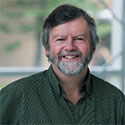
University Research Professor
Memorial University of Newfoundland
Dr. Snelgrove is a Professor of Ocean Sciences and Biology at Memorial University of Newfoundland in Canada. Dr. Snelgrove received a BSc. Hons degree in Biology at Memorial , a Master's degree in Oceanography from McGill University, and a Ph.D. from the Massachusetts Institute of Technology and Biology Department at Woods Hole Oceanographic Institution. Since 2008, he has been Director of the NSERC Canadian Healthy Oceans Network, a national research network in Canada that has already trained some 100 students working on all three of Canada's oceans to develop new tools and approaches to support sustainable oceans. He also currently plays the role of Associate Director of The Ocean Frontier Institute. From 2003-2013, Dr. Snelgrove held a Canada Research Chair in Boreal and Cold Ocean Systems and prior to that, an NSERC Industrial Chair in Fisheries Conservation. He led the synthesis of the International Census of Marine Life research program, where he was a member of the program's Scientific Steering Committee. Dr. Snelgrove published the book, "Discoveries of the Census of Marine Life: Making Ocean Life Count" with Cambridge University Press in 2010 and was a TED Global speaker in 2011. He has published over 100 papers and book chapters on marine biodiversity in the deep sea and coastal ocean. An inordinate fondness for life in seafloor mud brings him on this cruise.
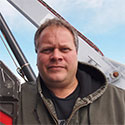
Supervisor and ROPOS Lead
Canadian Scientific Submersible Facility (CSSF)
Keith will be the supervisor and ROPOS lead on this mission. In addition to project management, Keith provides support for ROPOS' electronic and electrical systems, and the integration of new equipment. Keith has been providing engineering, management and operational support for numerous corporate, science and private submersibles since 1989. Beginning his work with the ROPOS ROV in 1992, he joined the CSSF team in 2002. Keith holds a Diploma of Technology in Robotics from BCIT.
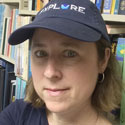
Curator of Mollusks
Delaware Museum of Natural History
Dr. Elizabeth Shea is the Curator of Mollusks at the Delaware Museum of Natural History in Wilmington, Delaware. She graduated from the College of William and Mary with a bachelor’s degree in biology and a master’s degree in Marine Sciences. She earned a Ph.D. in Biology from Bryn Mawr College and spent a year as a National Research Council post-doc with the National Marine Fisheries Service in Washington, DC. Her research focuses on the biodiversity of cephalopods in the northwest Atlantic, and her collections interests include digitizing freshwater and terrestrial molluscan specimen data as part of the National Science Foundation-funded InvertEBase project. Liz has participated in 18 offshore cruises, including midwater trawling at Bear Seamount, part of the New England Seamount Chain, and at the Gully Marine Protected Area in Atlantic Canada. Recently, she has been involved in exploring the Atlantic canyons with NOAA’s Northeast Regional Deep-Sea Coral and Sponge Initiative where she is analyzing the distribution of benthic octopods and sepiolids in the Atlantic canyons. On the Bigelow cruise, Liz will be participating in data acquisition, image annotation, and web coordination, with a particular interest in finding cephalopods tucked in, under, around, and on the corals and sponges.
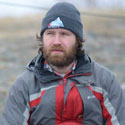
Ph.D. Student
Memorial University of Newfoundland
Joost Verhoeven received his Master of Science in biomedical sciences in 2014 from the Vrije Universiteit Amsterdam in The Netherlands and is currently pursuing a Ph.D. in molecular microbiology and ecology, supervised by Dr. Suzanne Dufour at the Memorial University of Newfoundland, Canada. His Ph.D. research focuses on exploring the intricate symbiotic relationships between microorganisms and carnivorous sponges found in deep-sea environments, with an additional goal of developing molecular and bioinformatic approaches to discover and characterize novel bacteria and viruses. Previous cruises in the Gulf of Maine (2014) and in Arctic waters (2015) revealed amazing insights into carnivorous sponges and their bacterial associates, and this cruise will be another exciting opportunity to further explore these enigmatic organisms.